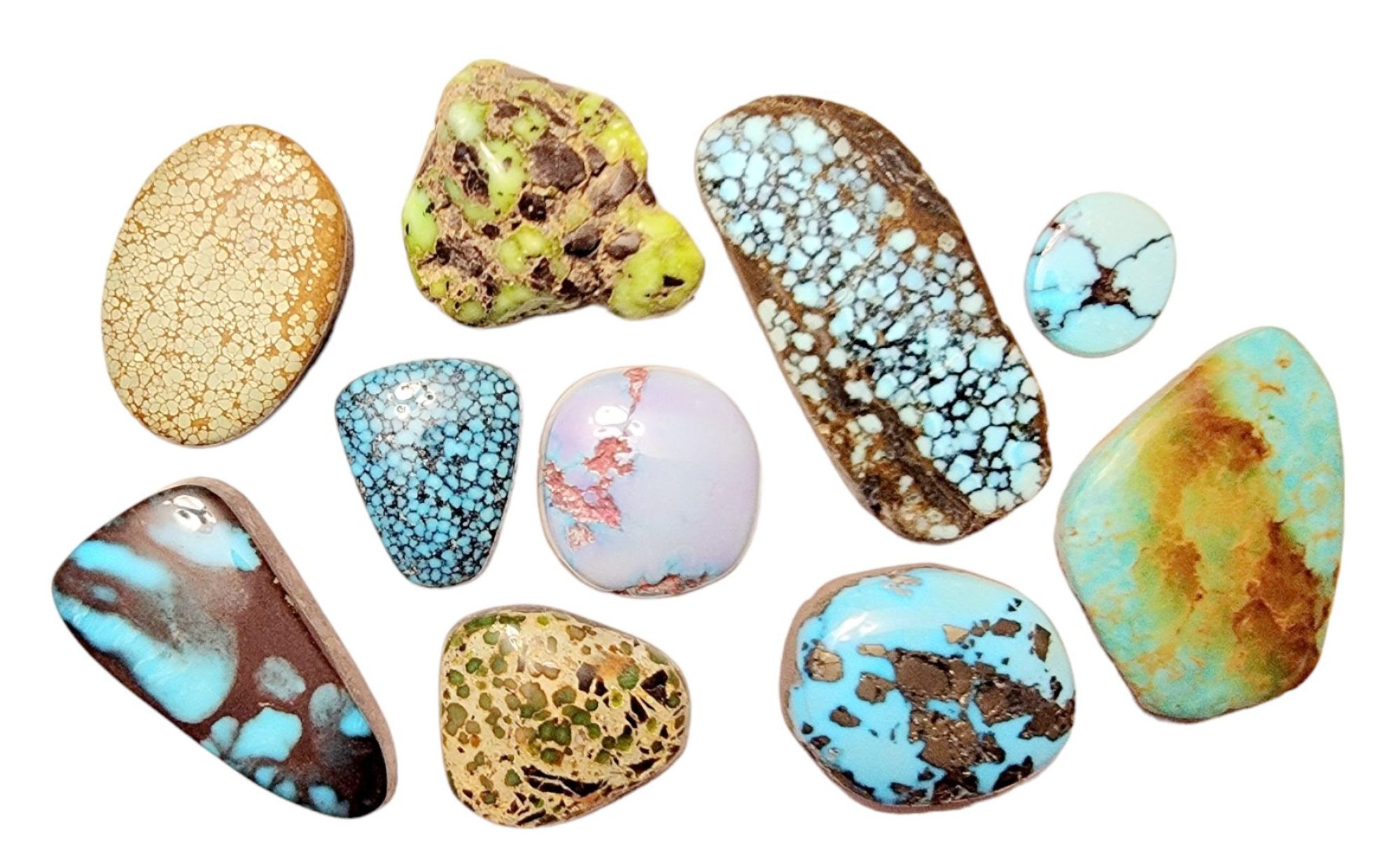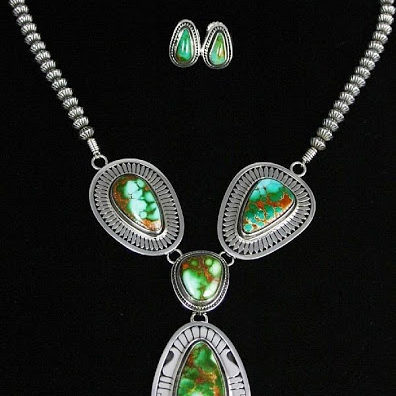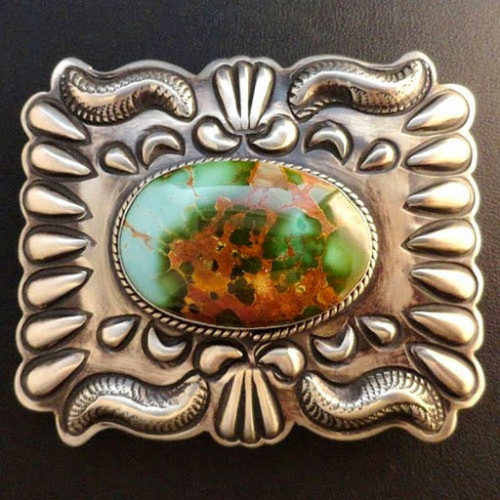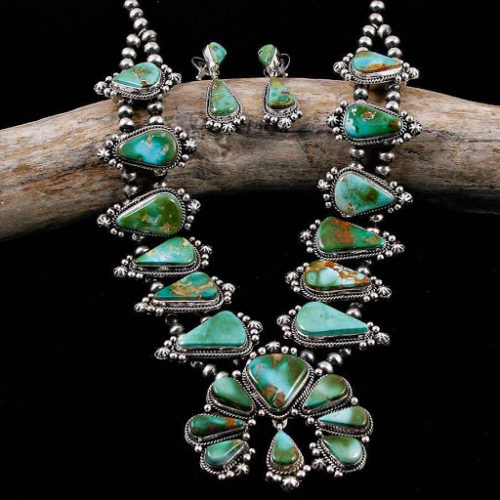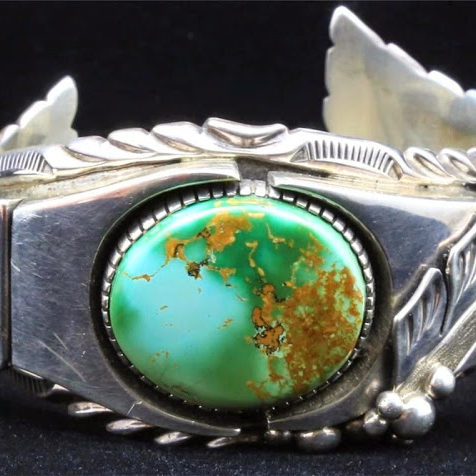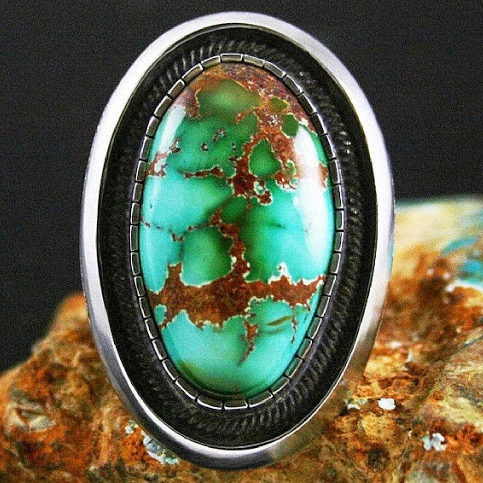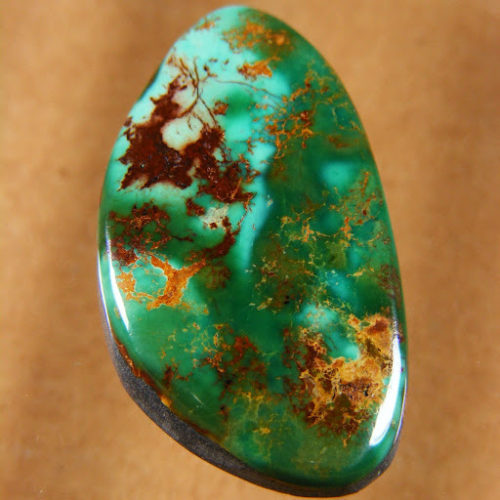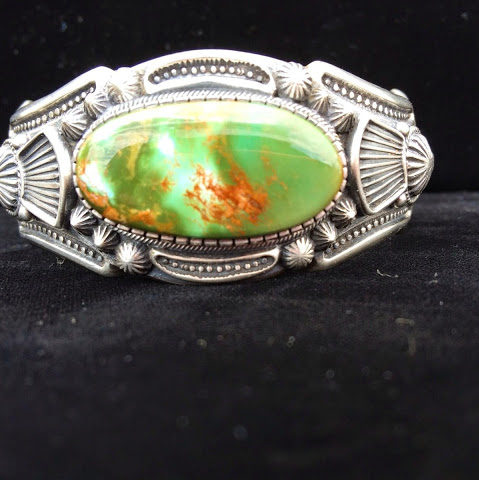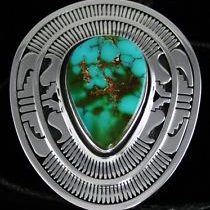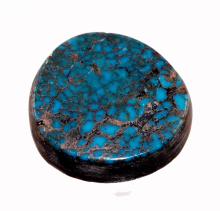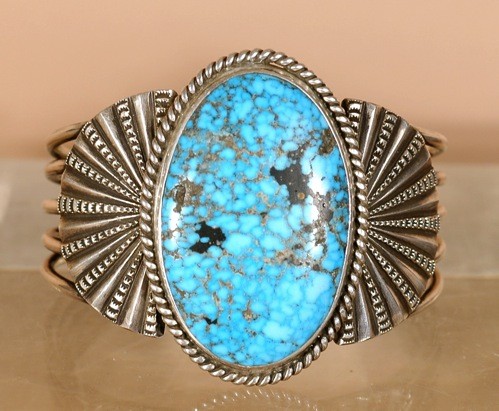Please note, examples are BELOW the descriptions. Also, feel free to click on any picture, for a larger view!
-
Royston is actually a district in Nevada consisting of three mines: Bunker Hill, Oscar Wehrend and the largest producer, Royal Blue. Notably, Royston turquoise is in beautiful colors, ranging from deep forest green to rich. Also, the light blues are set off by a heavy, brown matrix. The Royston district is still producing a small quantity of high quality turquoise.
-
In addition, Stormy Mountain turquoise mine is in Elko County, northeastern Nevada. Also, like the Blue Diamond mine, Stormy Mountain produces hard, dark blue turquoise that includes a blotchy, black chart matrix. This mine is presently not active.
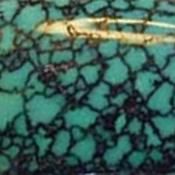 Alternatively, Indian Mountain is a contemporary mine. Equally important, Indian Mountain mine is in Lander County, Nevada.
Alternatively, Indian Mountain is a contemporary mine. Equally important, Indian Mountain mine is in Lander County, Nevada. 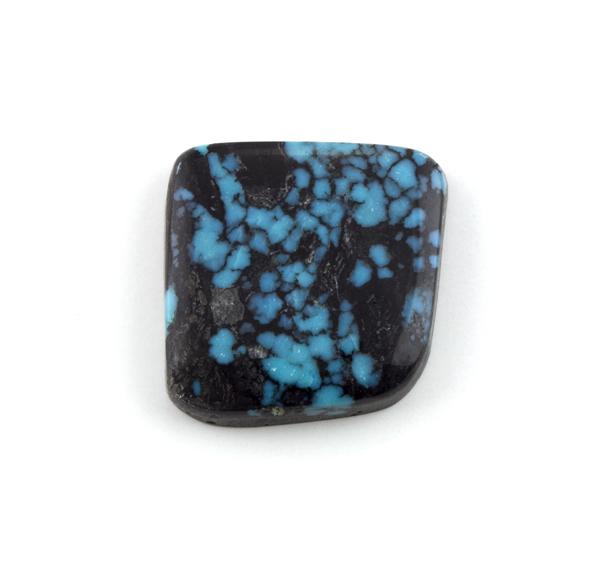 Next, Pilot Mountain is in Esmeralda County, Nevada. Equally important, Pilot Mountain turquoise ranges in color from blue to green with a dark brown, black or red matrix. Additionally, people admire this stone for its deep blue-green colors.
Next, Pilot Mountain is in Esmeralda County, Nevada. Equally important, Pilot Mountain turquoise ranges in color from blue to green with a dark brown, black or red matrix. Additionally, people admire this stone for its deep blue-green colors. -
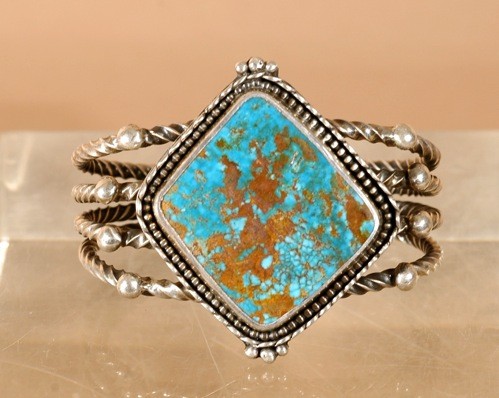 Then again, Turquoise Mountain and “Bird’s eye” turquoise comes from the same mine in Northwest Arizona near the Kingman mine, Mineral Park Mining District. Moreover, the mine closes in the 1980’s. In like manner, Turquoise Mountain turquoise is light to high blue with both web and non-web matrix. “Bird’s eye” describes stones from this mine that show areas of light blue circles with dark blue matrix, resembling the eye of a bird
Then again, Turquoise Mountain and “Bird’s eye” turquoise comes from the same mine in Northwest Arizona near the Kingman mine, Mineral Park Mining District. Moreover, the mine closes in the 1980’s. In like manner, Turquoise Mountain turquoise is light to high blue with both web and non-web matrix. “Bird’s eye” describes stones from this mine that show areas of light blue circles with dark blue matrix, resembling the eye of a bird -
Cerrillos turquoise mine, is between Santa Fe and Albuquerque, New Mexico, is one of the most famous prehistoric mining districts in the American Southwest. Consequently, Cerrillos is the only turquoise that forms at the base of a volcano; thus, a variety of colors develops from the minerals in the various volcanic host rocks. Seventy-five colors exists, from tan to khaki-green to rich, blue-green to bright, light colors. There are more than two hundred dig sites there, and the largest and most famous are the Blue Bell, Castilian and Tiffany mines.
- .

-
Red Mountain is in Lander County, Nevada. This mine, at one time, produces a large quantity of high grade turquoise. Consequently, the best Red Mountain turquoise rivals some of the high quality turquoise by the best mines in the Southwest. Red Mountain turquoise has an intricate, often red spider web matrix.
-
King’s Manassa turquoise is of Manassa, Conejos County, Colorado. Manassa turquoise has rich, brilliant greens and gold matrix. Blue and blue-green turquoise originate from these deposits as well.
-
Kingman mine is in Mohave County in western Arizona. The copper mining in the Mineral Park Mining District around Kingman produces a larger supply of turquoise throughout the years. The matrix of most Kingman is naturally white but miners usually dye the matrix with black shoe polish.
-
Cripple Creek turquoise mine is in Teller County, Colorado and miners looking for gold in the area also find turquoise deposits. Most importantly, two separate mines are currently active in the area both under the Cripple Creek name.
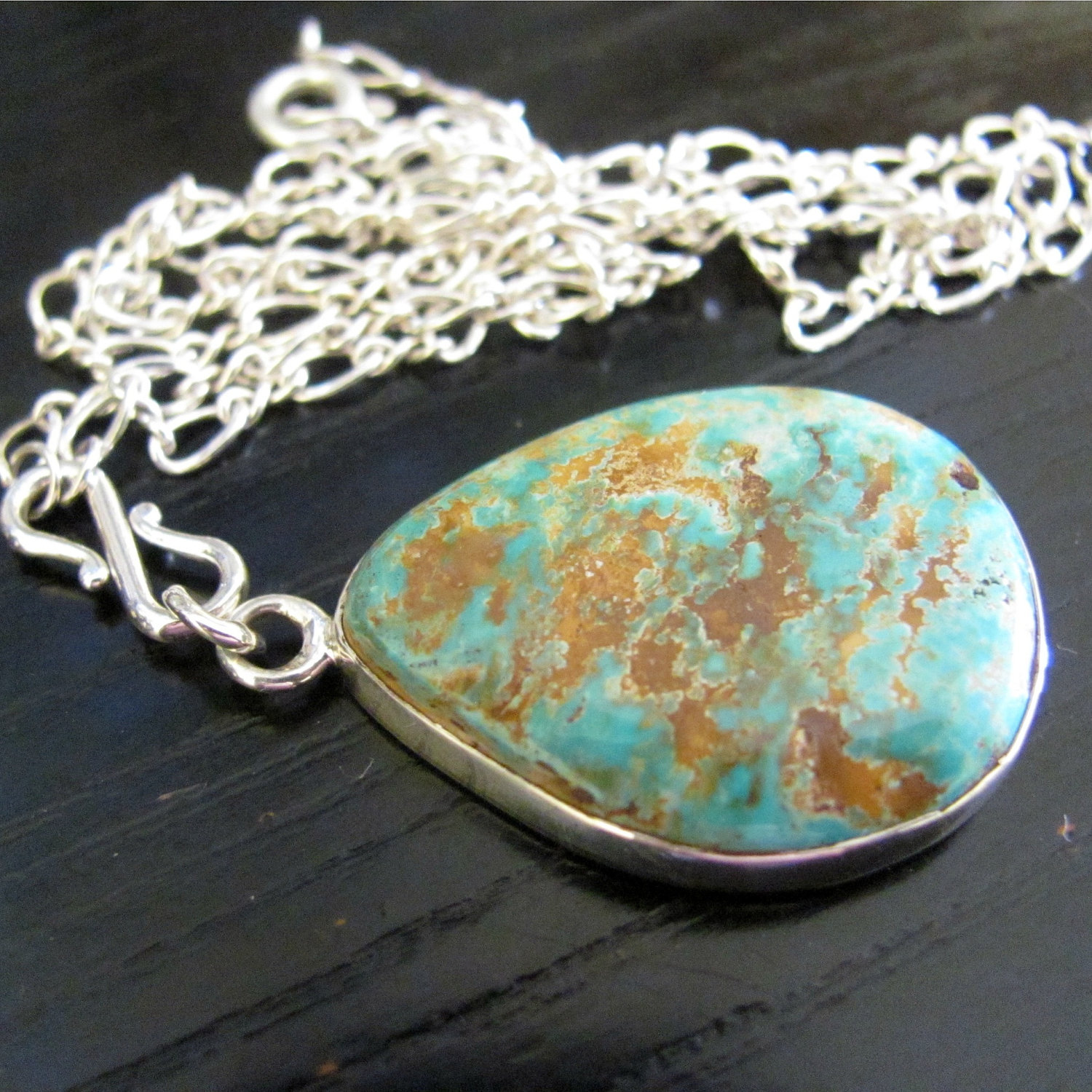 Blue Gem turquoise mine is approximately 6 miles south of Battle Mountain, Nevada. Consequently, it is within a large copper-mining operation. Blue Gem is almost every shade of green and blue from intense blues to deep green combinations with a hard, irregular matrix. As a matter of fact, of the multiple Nevada “Blue Gem” mines, the Battle Mountain Blue Gem mine, which begins production in 1934, yields the most valuable Blue Gem turquoise due to its rich color and hardness. This mine is no longer in business.
Blue Gem turquoise mine is approximately 6 miles south of Battle Mountain, Nevada. Consequently, it is within a large copper-mining operation. Blue Gem is almost every shade of green and blue from intense blues to deep green combinations with a hard, irregular matrix. As a matter of fact, of the multiple Nevada “Blue Gem” mines, the Battle Mountain Blue Gem mine, which begins production in 1934, yields the most valuable Blue Gem turquoise due to its rich color and hardness. This mine is no longer in business.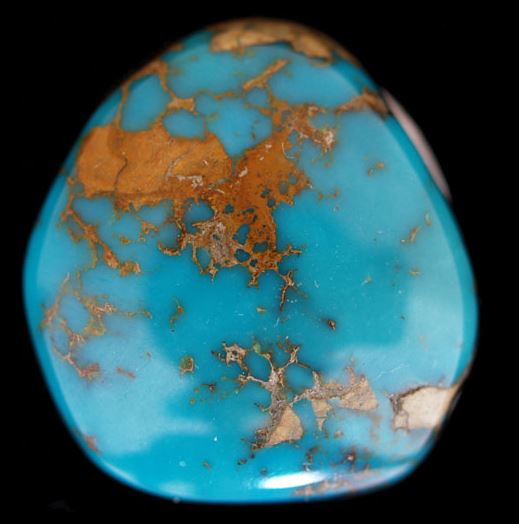 Next, Fox is one of Nevada’s most productive turquoise mines. The area produces a huge amount of good quality green or blue-green stone with a distinctive matrix.
Next, Fox is one of Nevada’s most productive turquoise mines. The area produces a huge amount of good quality green or blue-green stone with a distinctive matrix.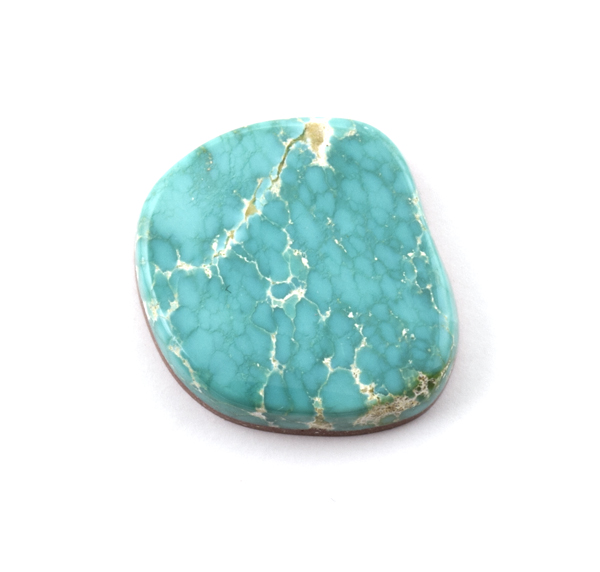 Number 8 mine is in Calin, Nevada, and is, at one time a gold and copper mining operation on the west side of the Tuscarora Mountain Range. In its prime, miners find enormous nodules, including one that weighs 150 pounds! Number 8 turquoise is famous for its black, golden-red and brown spider web matrix set off with the unique bright powder blue turquoise background. The mine is played out and Number 8 turquoise is valuable.
Number 8 mine is in Calin, Nevada, and is, at one time a gold and copper mining operation on the west side of the Tuscarora Mountain Range. In its prime, miners find enormous nodules, including one that weighs 150 pounds! Number 8 turquoise is famous for its black, golden-red and brown spider web matrix set off with the unique bright powder blue turquoise background. The mine is played out and Number 8 turquoise is valuable.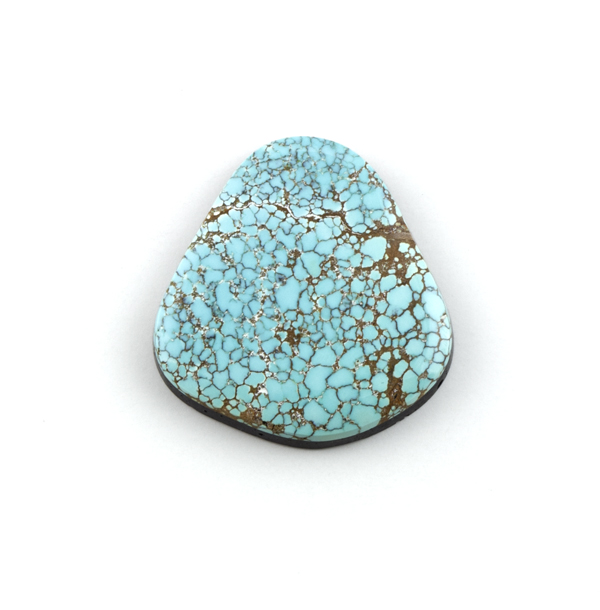 Sleeping Beauty mine, near Globe, Arizona, once produces a solid, light blue color with no matrix and is used in many styles of American Indian jewelry. Uniquely, a favorite of Zuni silversmiths, Sleeping Beauty is often in needlepoint, petite point, and inlay jewelry because of its consistency in color and is easy to cut. Notably, the miners sometimes add black to Sleeping Beauty to add definition, as in this example.
Sleeping Beauty mine, near Globe, Arizona, once produces a solid, light blue color with no matrix and is used in many styles of American Indian jewelry. Uniquely, a favorite of Zuni silversmiths, Sleeping Beauty is often in needlepoint, petite point, and inlay jewelry because of its consistency in color and is easy to cut. Notably, the miners sometimes add black to Sleeping Beauty to add definition, as in this example.
-
-
-
-
-
-
Lone Mountain aka Blue Jay Mine turquoise mine, in Esmeralda County, Nevada, once produces a great variety of turquoise. Usually nodules, it is some of the finest examples of spider web turquoise as well as clear, deep-blue stones. Among “classic” American turquoise, only Lander Blue is more valuable.
 Morenci turquoise is in southeastern Arizona, Greenlee County. It is high to light blue in color with an unusual matrix of irregular iron pyrite or “fool’s gold.” Consequently, when you polish it, it often looks like silver. Its name originates after the large open pit Morenci copper mine where a great deal of turquoise is from. The mine is played out.
Morenci turquoise is in southeastern Arizona, Greenlee County. It is high to light blue in color with an unusual matrix of irregular iron pyrite or “fool’s gold.” Consequently, when you polish it, it often looks like silver. Its name originates after the large open pit Morenci copper mine where a great deal of turquoise is from. The mine is played out. Lander Blue turquoise is from a mine in Lander County, Nevada, which a picnicker discovers in 1973. It produces some of the most beautiful spider-web turquoise ever. It is the rarest and the most valuable turquoise in the world. Miners find less than 110 pounds of this beautiful spider-web turquoise.
Lander Blue turquoise is from a mine in Lander County, Nevada, which a picnicker discovers in 1973. It produces some of the most beautiful spider-web turquoise ever. It is the rarest and the most valuable turquoise in the world. Miners find less than 110 pounds of this beautiful spider-web turquoise.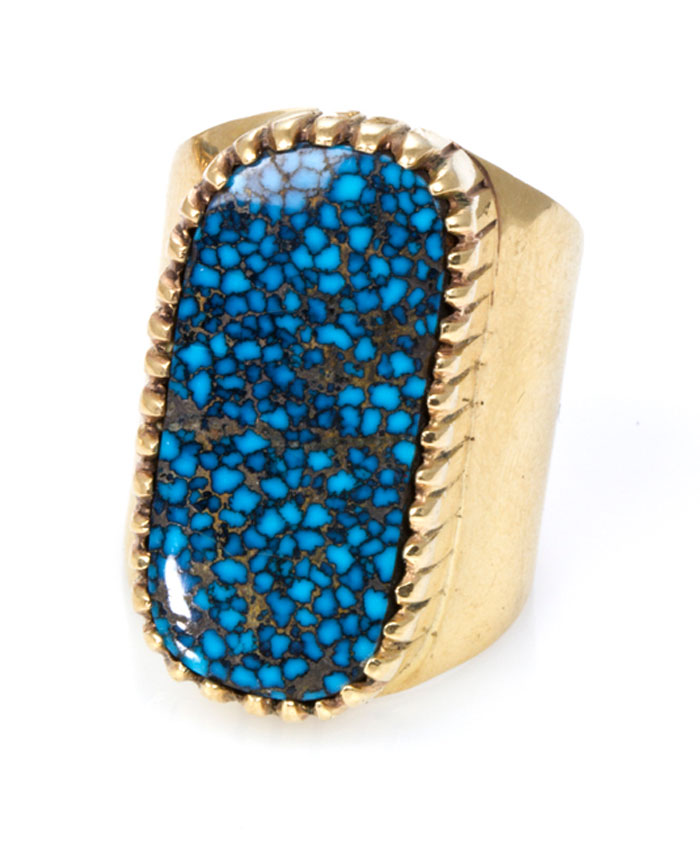 Bisbee turquoise comes from the Lavender Pit copper mine that is now closed. Bisbee turquoise is famous for its deep blue color and smoky black matrix.
Bisbee turquoise comes from the Lavender Pit copper mine that is now closed. Bisbee turquoise is famous for its deep blue color and smoky black matrix. 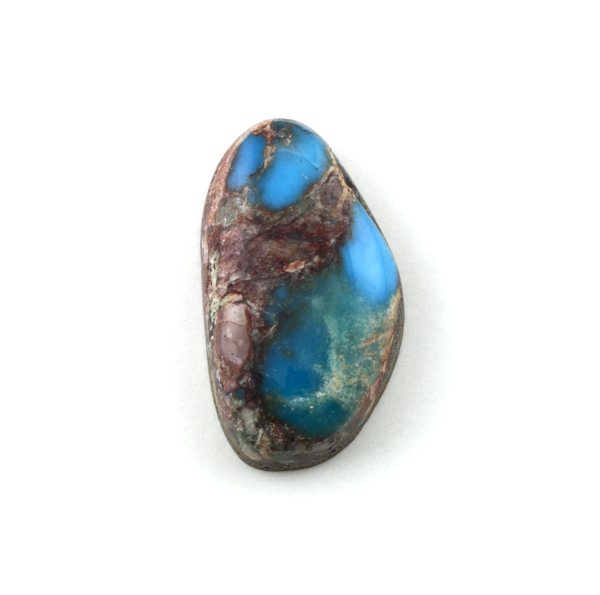 Stone Mountain is a small mine in Northern Nevada. The mine produces a fine hard gem grade turquoise with colors ranging from a variety of greens to a medium blue. Also, it can be slightly translucent with markings of limonite.
Stone Mountain is a small mine in Northern Nevada. The mine produces a fine hard gem grade turquoise with colors ranging from a variety of greens to a medium blue. Also, it can be slightly translucent with markings of limonite. 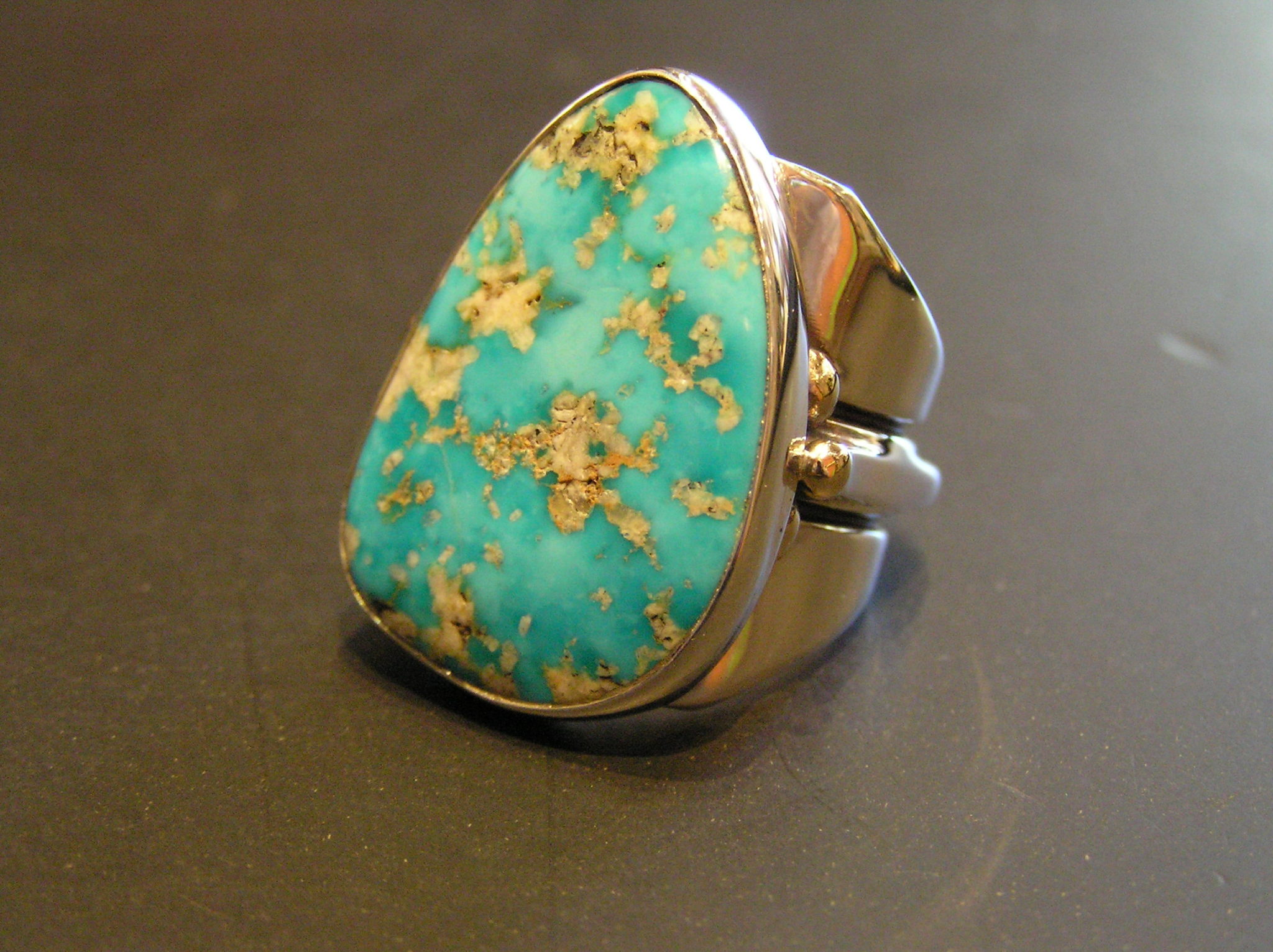 Carico Lake turquoise refers to the location of it’s mine on a dry lake bed in a high, cool area of Lander County, Nevada. Correspondingly, it’s clear, iridescent, spring-green color is due to its zinc content and is highly unique and collectible. Alternately, Carico Lake turquoise can also be a dark blue-green color with a black, spider web matrix. Mines in this district also produce faustite, an apple-green mineral similar to turquoise but becomes a separate mineral in 1953.
Carico Lake turquoise refers to the location of it’s mine on a dry lake bed in a high, cool area of Lander County, Nevada. Correspondingly, it’s clear, iridescent, spring-green color is due to its zinc content and is highly unique and collectible. Alternately, Carico Lake turquoise can also be a dark blue-green color with a black, spider web matrix. Mines in this district also produce faustite, an apple-green mineral similar to turquoise but becomes a separate mineral in 1953.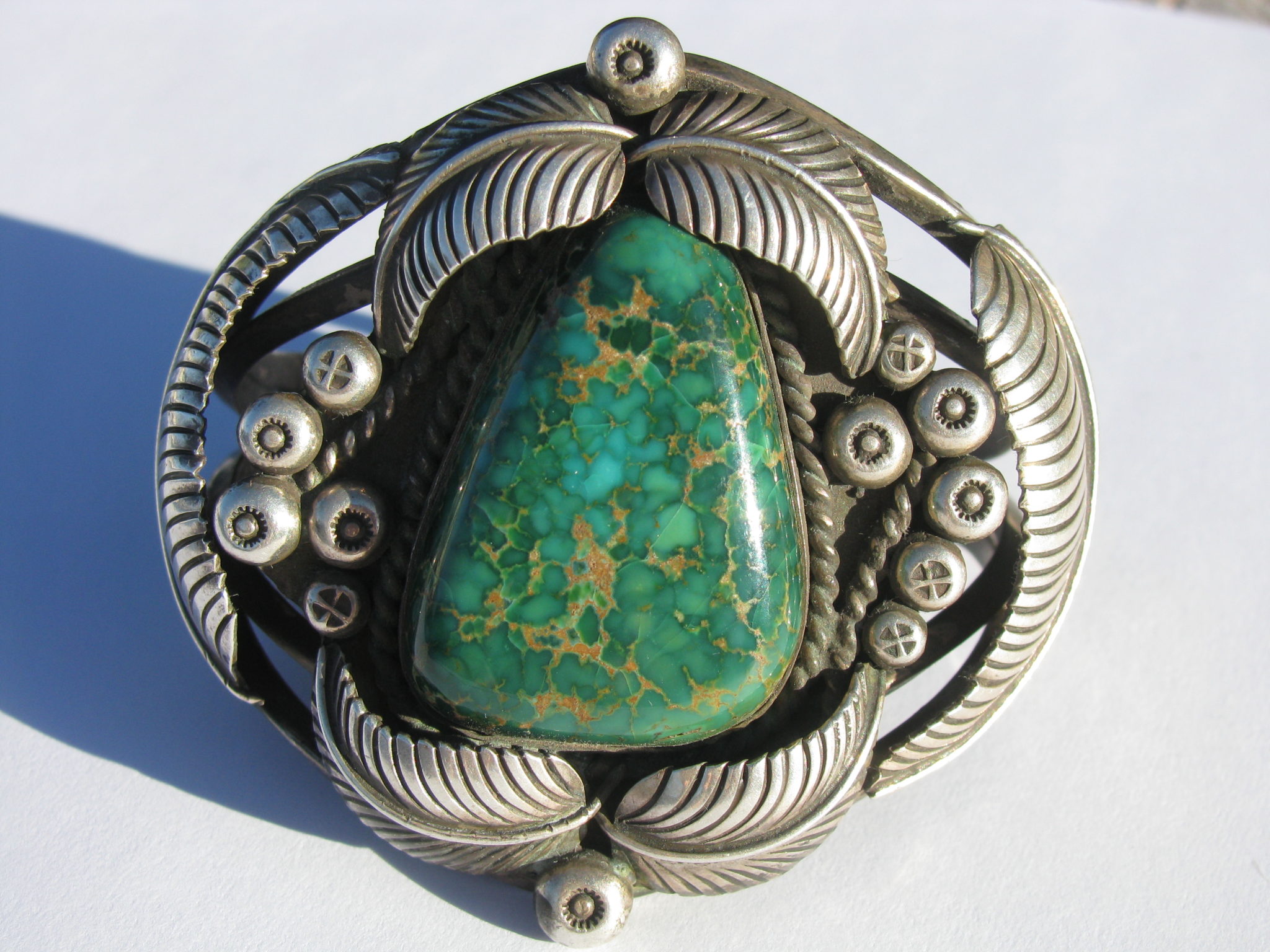 Damele (Variscite – see definitions page) aka Damali mine is in east-central Nevada near the Carico Lake mine. Ironically, Damele Turquoise is quite distinctive because the zinc content turns the stone yellow-green and increases its hardness. Finally, the matrix of Damele is web with a dark brown to black matrix.
Damele (Variscite – see definitions page) aka Damali mine is in east-central Nevada near the Carico Lake mine. Ironically, Damele Turquoise is quite distinctive because the zinc content turns the stone yellow-green and increases its hardness. Finally, the matrix of Damele is web with a dark brown to black matrix. Dry Creek turquoise mine is on the Shoshone Indian Reservation near Battle Mountain, Nevada. The lack of any specific color consistency makes this stone distinctive and unique. Equally important, because this turquoise is as rare as the sacred buffalo, the Indians call it “Sacred Buffalo” Turquoise.
Dry Creek turquoise mine is on the Shoshone Indian Reservation near Battle Mountain, Nevada. The lack of any specific color consistency makes this stone distinctive and unique. Equally important, because this turquoise is as rare as the sacred buffalo, the Indians call it “Sacred Buffalo” Turquoise.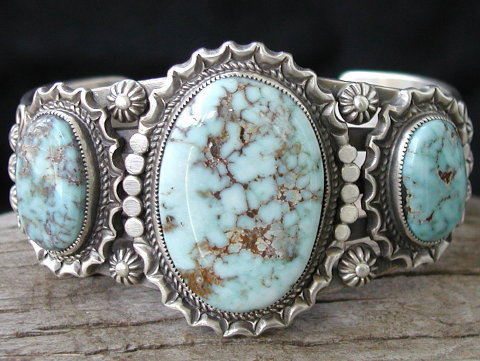
-
-
-
-
-
-
-
-
-
-
-
-
-
Easter Blue mine is northwest of Tonopah, Nevada, a few miles from the Royston district. Miners find this turquoise in 1907 and the first material is a fine blue color. Consequently, it usually occurs in thin veins, later the mine produces a blue green turquoise with a light to dark brown matrix.
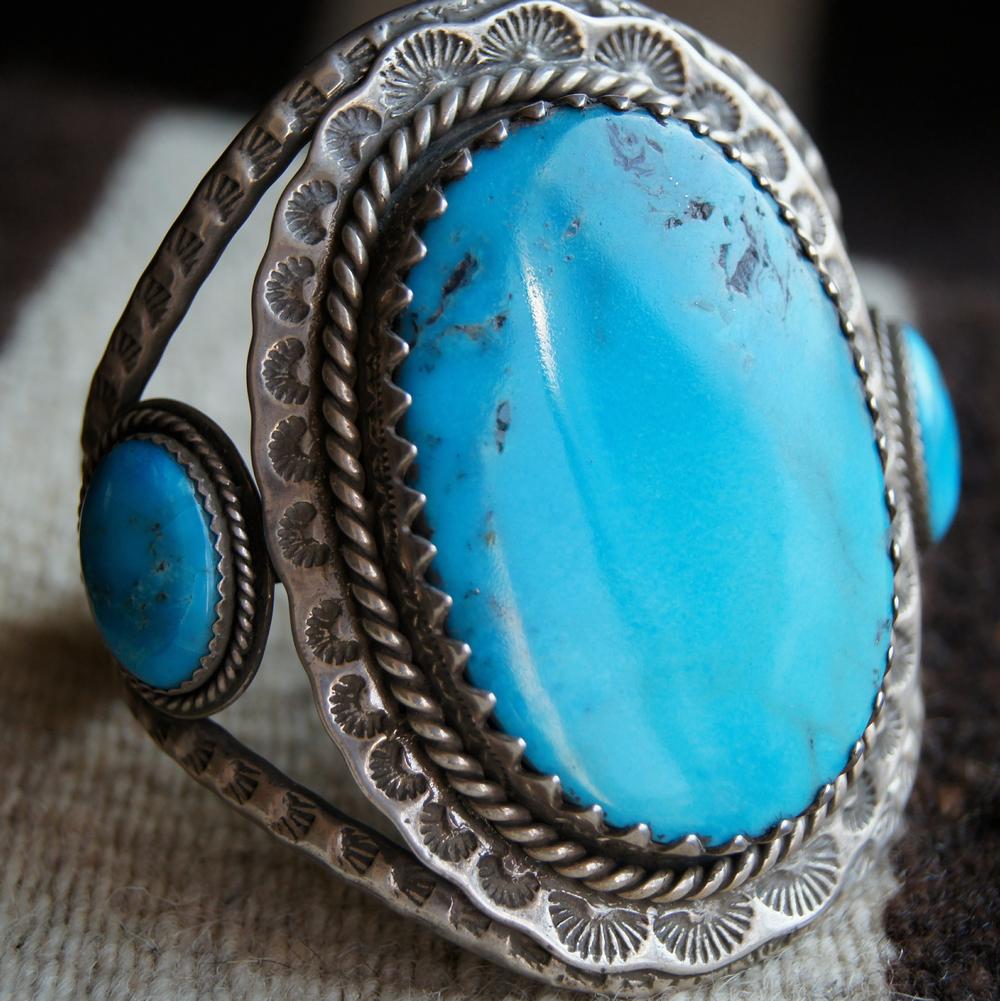 Godber-Burnham mine is east of Austin, Nevada and miners find it in 1932. The first claim is under the name “Last Chance.” It later sells to Frank Burnham and then in 1934 to Walter Godber. The turquoise ranges from medium to dark blue, usually with a beautiful spider webbing. It has a very dark or black mottling forming blotches and veins running through the stone.
Godber-Burnham mine is east of Austin, Nevada and miners find it in 1932. The first claim is under the name “Last Chance.” It later sells to Frank Burnham and then in 1934 to Walter Godber. The turquoise ranges from medium to dark blue, usually with a beautiful spider webbing. It has a very dark or black mottling forming blotches and veins running through the stone.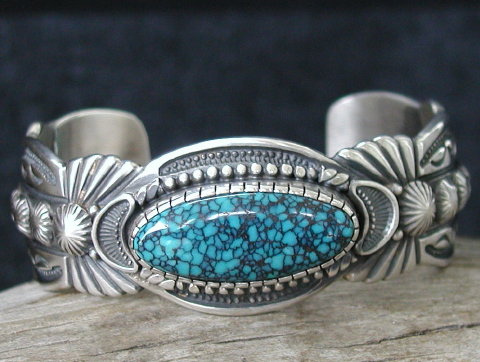 Nevada Blue becomes famous in the 1970’s with its beautiful turquoise and its wide spread use by most all of the well-known Native American jewelers. Most notably, including Charles Loloma and Lee Yazzie use this material. Jim Watts discovers the turquoise in 1901. Nevada Blue ranges in color from sky blue to a rich dark blue with a reddish brown or sometimes black spider-web.
Nevada Blue becomes famous in the 1970’s with its beautiful turquoise and its wide spread use by most all of the well-known Native American jewelers. Most notably, including Charles Loloma and Lee Yazzie use this material. Jim Watts discovers the turquoise in 1901. Nevada Blue ranges in color from sky blue to a rich dark blue with a reddish brown or sometimes black spider-web.
-
-
-
-
-
-
-
-
Blue Moon turquoise mine is active until the late 1970′s in Esmeralda County, Nevada. Typically, the material is light-sky blue with a dark brown to black matrix.
-
Orvil Jack discovers and develops the mine in northern Nevada that bears his name. The mine is at Blue Ridge in Crescent Valley. By the same token, the rare yellow-green color of the turquoise comes from the zinc content. Most notably, only a small amount is now being produced.
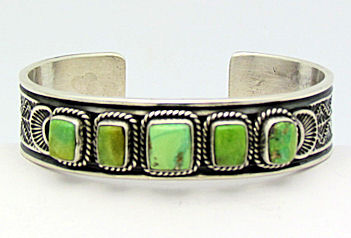
-
Ajax mine is in south-central Nevada in the Royston area. Uniquely, is is a relatively new mine that yields stones from light blue with darker blue veins to a predominate dark green with light blue veins. The dark green with light blue veins is quite unusual for turquoise.
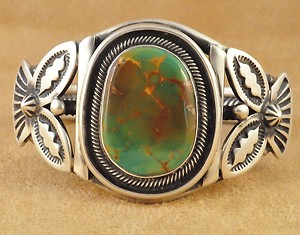
Types of Turquoise 1990 – 2025 © Schannep Ventures L.L.C. ALL RIGHTS RESERVED
